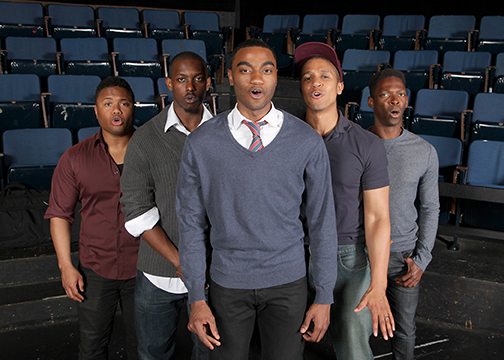by Charles Brousse
When plays and musicals are praised for their “theatricality,” it usually means that the artists involved have succeeded in creating an exciting alternate reality that encourages people to stop worrying about the plausibility of what they’re seeing and embrace an approach to truth that is based on what the English poet/aesthetic philosopher Samuel Taylor Coleridge, writing in 1813, called a “willing suspension of disbelief.” Once that level of involvement is achieved, almost anything that happens on stage is acceptable.
The opening night audience’s enthusiastic response to Marin Theatre Company’s season-ending Bay Area premiere of Tarell Alvin McCraney’s Choir Boy illustrates what a powerful influence theatricality can be.
Writing at a time when America is wracked with angst over racial and LGBT issues, McCraney loads his script with emotional dynamite. The setting is the Charles R. Drew Prep School for Boys, an African-American enclave of a type that used to be fairly common south of the Mason-Dixon Line, but today is becoming increasingly rare. His protagonist, Pharus Jonathan Young, is the effeminate and extremely talented student leader of Drew’s renowned choir. The choir’s performances at the annual graduation ceremonies are used to help open the wallets of wealthy donors. In the drama’s opening moments he is front and center, singing a solo version of the school anthem when he is interrupted by a voice accusing him of being a closeted homosexual. To the dismay of Drew’s headmaster and Board of Directors, who see their financial future imperiled, the severely shaken Pharus is unable to continue.
That incident sets the story line for the remainder of the roughly 90-minute, intermission-less play. The accuser is a fellow choir boy, Bobby Marrow, the headmaster’s nephew, who aspires to replace Pharus as group leader. Their rivalry intensifies as they hurtle toward a conclusion that will benefit neither, and Pharus has to confront the issue of his own sexual identity. All of this takes place against a chattering background of concerned relatives and school officials that adds fuel to the already incendiary atmosphere.
Admittedly, it’s a lot to digest, and in the initial stages I found myself questioning both the credibility of McCraney’s premises and some of MTC director Ken Gash’s production choices. For example, how could Drew’s vaunted choir—supposedly the institution’s major vehicle for attracting donors—be composed of only five boys? Why did Headmaster Marrow approve Pharus, whose exaggerated speech and mannerisms clearly suggest he is gay, to represent the school to an extremely conservative board and public? Why are actors of an age more suited to post-doctoral students cast to play 16-year-olds? And why are the two adults—the headmaster and a venerable teacher named Mr. Pendleton—made to seem so ineffectual?
The more I watched Choir Boy unfold, however, the more these doubts were replaced by the pure pleasure of watching the skillful performances of Jelani Alladin, Jaysen Wright, Dimitri Woods, Forest Van Dyke and Rotimi Agbabiaka, including rocking dance numbers and beautifully harmonized spirituals (organized by music director Darius Smith). Although Ken Robinson (Headmaster Marrow) and Charles Shaw Robinson (Mr. Pendleton) are not the main attraction, they are a nice counterbalance to their boisterous “adolescent” charges.
McCraney is a very hot young playwright these days, and “theatricality” is his trademark.
Charles can be reached at cb******@*tt.net.
NOW PLAYING: Choir Boy runs through June 28 at the Marin Theatre Company, 397 Miller Ave., Mill Valley. For more information, call 415/388-5200, or visit marintheatre.org.









